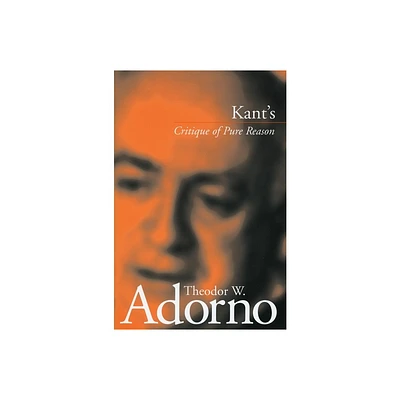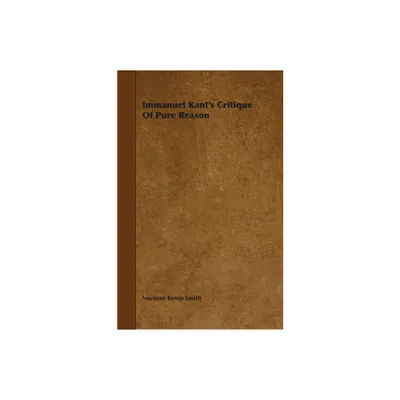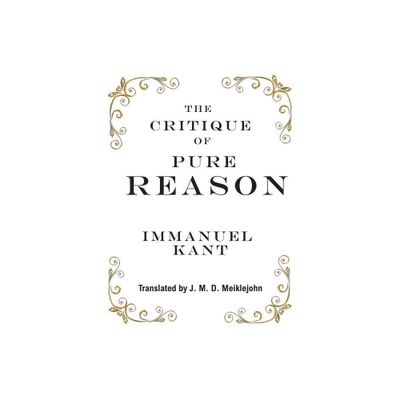Home
Ought Implies Kant: A Reply to the Consequentialist Critique
Loading Inventory...
Barnes and Noble
Ought Implies Kant: A Reply to the Consequentialist Critique
Current price: $120.00


Barnes and Noble
Ought Implies Kant: A Reply to the Consequentialist Critique
Current price: $120.00
Loading Inventory...
Size: OS
*Product Information may vary - to confirm product availability, pricing, and additional information please contact Barnes and Noble
Ought Implies Kant
offers an original defense of the ethical theory of Immanuel Kant, and develops an extension of that theory’s account of moral duty to include direct duties to nonhuman animals. The discussion centers on a critical examination of consequentialism, the view that the rightness or wrongness of an action is determined solely by its consequences. Kantianism, by contrast, claims that the core of ethics is to treat all persons—or, in Joel Marks’s view, all living beings—as ends-in-themselves. The consequentialist criterion would seem to permit, indeed require, violating the dignity of persons (not to mention the dignity of other animals) if this would result in a better outcome. This volume treats the consequentialist challenge to Kantian ethics in several novel ways. To begin with, the utilitarian version of consequentialism is delineated and defended by means of a conceptual device dubbed by the author as the Consequentialist Continuum. Marks then provides an exhaustive and definitive exposition of the relatively neglected Epistemic Objection to utilitarianism. While acknowledging the intuitive appeal of utilitarianism’s core conviction—that we should always do what is for the best—Marks argues that this is an impossible injunction to fulfill, or even to attempt to fulfill, because all of the relevant results of our actions can never be known. Kantianism is then introduced as a viable alternative account of our ethical obligations. Marks argues that Kantianism is well within the scope of normal human competence and conforms equally well to our ethical intuitions once the theory’s proper interpretation is appreciated. However, Kant’s own version must be extended to accommodate the rightful moral consideration we owe to nonhuman animals. Finally, Marks employs the notion of a Consequentialist Illusion to explain utilitarianism’s hold on our moral intuitions, while developing a form of Consequentialist Kantianism to address them.An original and penetrating examination of a central debate
offers an original defense of the ethical theory of Immanuel Kant, and develops an extension of that theory’s account of moral duty to include direct duties to nonhuman animals. The discussion centers on a critical examination of consequentialism, the view that the rightness or wrongness of an action is determined solely by its consequences. Kantianism, by contrast, claims that the core of ethics is to treat all persons—or, in Joel Marks’s view, all living beings—as ends-in-themselves. The consequentialist criterion would seem to permit, indeed require, violating the dignity of persons (not to mention the dignity of other animals) if this would result in a better outcome. This volume treats the consequentialist challenge to Kantian ethics in several novel ways. To begin with, the utilitarian version of consequentialism is delineated and defended by means of a conceptual device dubbed by the author as the Consequentialist Continuum. Marks then provides an exhaustive and definitive exposition of the relatively neglected Epistemic Objection to utilitarianism. While acknowledging the intuitive appeal of utilitarianism’s core conviction—that we should always do what is for the best—Marks argues that this is an impossible injunction to fulfill, or even to attempt to fulfill, because all of the relevant results of our actions can never be known. Kantianism is then introduced as a viable alternative account of our ethical obligations. Marks argues that Kantianism is well within the scope of normal human competence and conforms equally well to our ethical intuitions once the theory’s proper interpretation is appreciated. However, Kant’s own version must be extended to accommodate the rightful moral consideration we owe to nonhuman animals. Finally, Marks employs the notion of a Consequentialist Illusion to explain utilitarianism’s hold on our moral intuitions, while developing a form of Consequentialist Kantianism to address them.An original and penetrating examination of a central debate


















